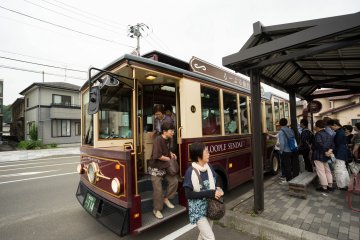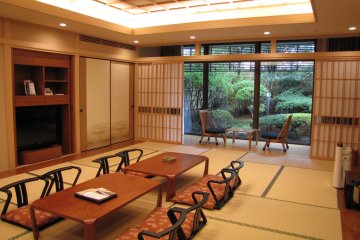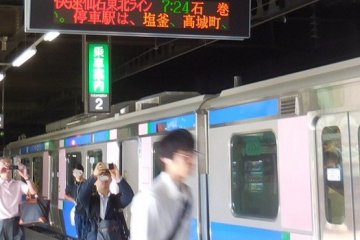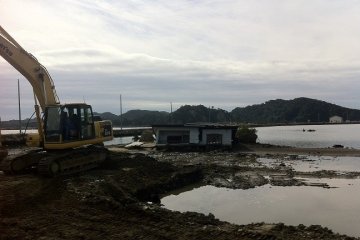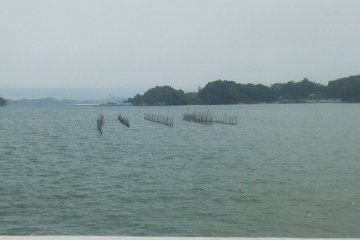There must be many people who want to go and see the areas devastated by a natural disaster, such as the Great East Japan Earthquake and Tsunami, which is said to occur once a millennium. In the case of the Great East Japan Earthquake, despite such demand, it was hard to get there because public transportation had been heavily damaged since March 2011.
After a more than four-year wait, the tsunami-hit JR Senseki Line resumed full operation on May 30, 2015. The Senseki Line which connects Sendai with Ishinomaki makes travel to the areas damaged by tsunami easier. This line also runs through coastal regions with very wonderful scenery, including Matsushima, which is called one of Japan’s three most beautiful views, together with the Amanohashidate sandbar in Kyoto and Hiroshima’s Miyajima.
You can see the picturesque pine-topped islands of Matsushima Bay from the platform of Matsushima Kaigan Station. After passing Matsushima Kaigan Station, the railway runs along the bay. The view between Rikuzen Otsuka and Tona is especially wonderful. You must be impressed with the beautiful scenery from the train; however, those areas were some of the most severely damaged due to several tsunamis. That is why the 3-5 km section between Tona Station and Nobiru Station were relocated 500 meters inland from the coast to higher ground on reclaimed land. Those stations were built in developed areas for people who lost their homes and can’t live where they used to in the coastal areas. The areas are designated as disaster hazard zones, so they can no longer be used for residential purposes. Around those two stations many new houses will have been built in a few years, but at the present there are only spacious vacant lots.
Crossing the Naruse River and the Yoshida River, you see open plain rice fields. Yamoto, the third station from Nobiru Station, is called Blue Impulse Town. The Japan Air Self-Defense Force Matsushima Base is here. Trainings of acrobatic flight by Blue Impulse pilots are held regularly. You can see a heart mark made by the white smoke of Blue Impulses under a blue sky if you are lucky. The training schedule is posted on the air force’s web site, although it is subject to change. There are only 5 stations to Ishinomaki Station from Yamoto Station on the local train line.
With the resumption of full service, the journey between Sendai and Ishinomaki, a distance of 49 km, takes just 52 minutes via the rapid service train. Combined with the necessary bus, it took nearly 2 hours before. In addition, there are two transportation options between Sendai and Ishinomaki. One is the original line via Hon-Shiogama Station and Matsushima-kaigan Station, and the other operates on the Tohoku Line and is incorporated into the Senseki Line between Shiogama Station and Takagi Station of Matsushima Town. That new line is called “the Senseki-Tohoku Line,” and has a rapid service enabling to reach Ishinomaki from Sendai in only 52 minutes. This is also very beneficial for foreign visitors. Previously the line hit by the tsunami was replaced by the bus service and you had to change twice: from the train to bus, and from bus to the train on the way to Ishinomaki. There were no detailed explanations about alternative means in English and it was too complicated to understand. When the train reached the station where you had to change, the announcement was only in Japanese. Every passenger was getting out of the train halfway to Ishinomaki, while you might have been left and might have been puzzled to understand what was happening. Now it is OK. Once you get on either the Senseki Line or the Senseki-Tohoku Line, it takes you to Ishinomaki without needing to worry or feel excluded. You can go to one of the most severely damaged cities, Ishinomaki, easily, even if you have trouble with the Japanese language.
The trip to the coastal areas hit by the tsunami is really something. The Senseki Line may take longer, but you can see more along the route.



